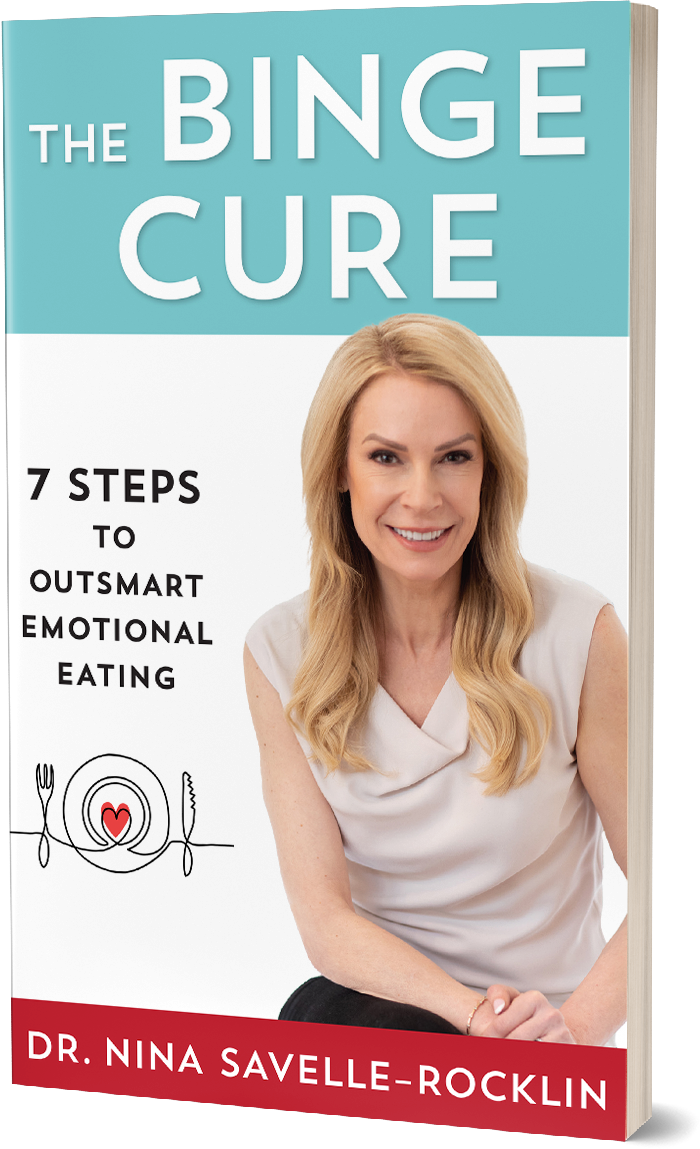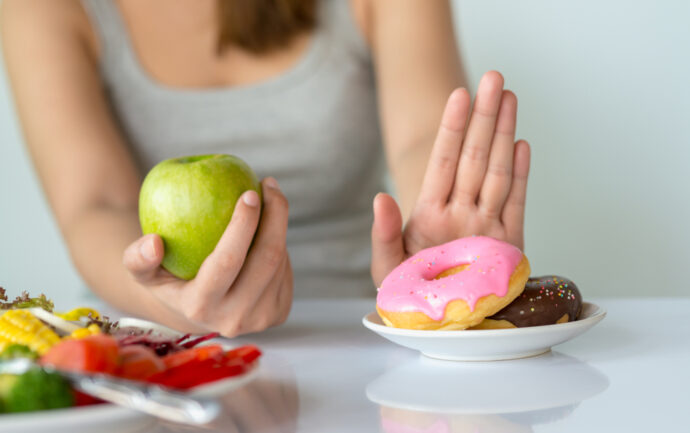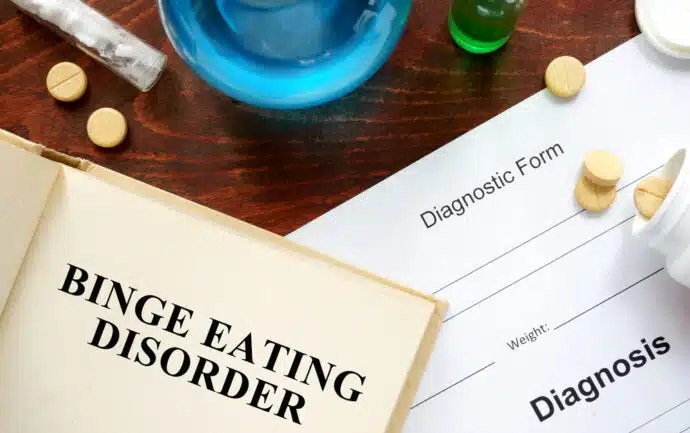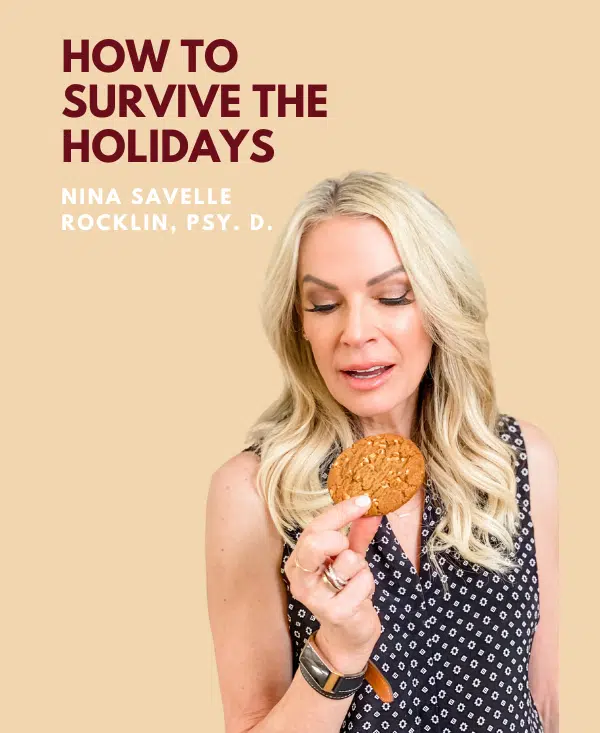Dr. Nina Savelle-Rocklin
How to Stop Binge Eating When Bored?
Table of Contents
- Is it really boredom?
- Hannah’s Story:
- Laura’s Story:
- How to distinguish loneliness and boredom
- Turn loneliness into solitude
- Loneliness and social anxiety
- How to connect with other people
- Here are some other actions you can take to alleviate social anxiety and loneliness:
- Other ways to deal with boredom
- How to Stop Binge Eating When Bored: Final Thoughts
- Frequently Asked Questions:
Maybe you try to resist temptation, but no matter how much willpower you use, you feel inexplicably pulled to the kitchen as if drawn by a powerful magnet. Like the Millennium Falcon drawn toward the Death Star in the first Star Wars movie. Resistance is futile.
Before you know it, there’s an empty box of your favorite snack and you’re scrounging for what to eat next. As you do so, you’re filled with regret and self-loathing. You feel like you just can’t stop.
In this blog, I will give strategies on how to stop binge eating when bored, so you can not only stay out of the kitchen but also live without constant food thoughts.

Is it really boredom?
We live in a busy society and many of us have to-do lists that seem like they’ll never end. We’re so preoccupied with tasks that we don’t have time to think about anything other than what we’re doing.
When we finally stop being so busy, we may feel restless and bored. That’s when we head for the kitchen or the drive-through or order something through an app.
There may be deeper meanings behind what we label as boredom. “Bored” is the state of being weary or uninterested in a current activity or situation. This often happens when we’re not engaged by our environment, when we’re not doing something we find interesting, or when we’re in a situation that makes us unsatisfied or restless.
Boredom can be temporary, like waiting in a long line or sitting through a boring lecture, or it can be more pervasive, affecting our overall mood.
When we say we’re “bored” that can be an umbrella term for something else. Here are some possibilities:
- Avoidance of discomfort: We may use boredom to avoid experiencing uncomfortable feelings, thoughts, or situations. Instead of consciously recognizing that we’re upset, sad, anxious, or depressed, we convert those emotions or conflicts into “boredom.”
- Feeling unchallenged: If we’re not mentally stimulated or challenged, we sometimes describe that feeling as boredom. In this case, feeling bored means craving something more intellectually or creatively engaging.
- Sign of burnout or depression: Persistent boredom, especially when we feel a lack of interest in things that used to bring joy, can signify burnout or depression.
- Lack of purpose: Feeling bored might reflect a more profound feeling of being unfulfilled or lacking direction in life. This sense of emptiness can be experienced as boredom.
- Difficulty expressing emotions: The word “bored” can be shorthand for other emotions such as loneliness, regret, or other feelings that can be unpleasant or threatening.
The meaning of boredom varies from person to person. If you’re persistently bored and turning to food, consider what lies beneath that boredom. By addressing the underlying reasons for boredom binges, we eliminate the behavior.
Hannah’s Story:
Hannah initially believed she was eating out of boredom. She is a successful professional woman who lived alone with her rescue dog, a chihuahua named Peanut. She had a demanding job, supportive friends, and her hobby was watching Formula 1 racing. Hannah was upset because she frequently snacked in the evenings.
She said, “I know I’m eating because I’m bored. How do I stop? Nothing is working.”
The key to resolving boredom is to do something that is interesting and occupies your mind and your time. Hannah had lots of things to do to occupy herself, but she always felt a restlessness that was only eased by snacking.
When we explored this “boredom” in more depth, we identified that Hannah only ate out of boredom at night and usually after spending time with a married couple who were her closest friends.
She realized she felt a yearning for a romantic relationship that she had suppressed by telling herself she didn’t need anyone else to live a fulfilling and happy life. Hannah was proud of her independence and didn’t want to “admit” that she wanted a partner.
She thought she ought to feel satisfied with her own company and that of her dog and that wanting a relationship somehow compromised her. She didn’t consider the idea of interdependence, which means balancing self-sufficiency with connection and collaboration.
This wish for connection was uncomfortable, and Hannah had kept it out of her conscious awareness by labeling it as “boredom” and eating as a way of distracting herself and symbolically filling the void of loneliness.
Realizing that she was equating loneliness with boredom was a turning point. She learned to lean into these feelings instead of avoiding them, to acknowledge her wishes, and respond differently to herself. As she addressed her loneliness, Hannah reduced her habit of eating when she felt “bored.”
As you can see, eating while “bored” can hide the actual problem. In Hannah’s case, she was eating as a distraction from loneliness. For other people, eating when bored can have different meanings, as was the case with Laura, a working mom who also ate when she was bored. And she was bored a lot.
Laura’s Story:
Laura is a working mother who managed a busy schedule, juggling her demanding job with taking care of three children. She was constantly on the go from the moment she woke up in the morning until her children were tucked into bed.
Nearly every night, Laura found herself heading to the kitchen after the kids were asleep and the house was quiet. Her husband worked in finance and always went to bed early. So, nighttime was the only time Laura had to herself.
It turned out that her late-night eating wasn’t about boredom. It was her way of carving out some much-needed “me time.” Throughout the day, Laura was so focused on fulfilling her responsibilities at work and caring for her children that she had no time for herself. Eating became her way of taking a break and unwinding.
Just as with Hannah, food was not the problem, it was the solution to the problem. The problem was that Laura did not make the time for self-care and relaxation. She took care of everyone in her life and food took care of her.
We came up with some strategies for Laura to make changes. She started taking breaks throughout the day. She listened to an audiobook, she took a walk, and she made sure she had “me time” every day so she could recharge. By giving herself what she really needed, she broke her pattern of boredom eating for good.
As you can see from these examples, we often think we’re bored when we are actually empty, lonely, or trying to distract ourselves from uncomfortable thoughts and emotions.
The next time you’re feeling bored, take a moment and try to figure out if there’s something deeper going on. One common cause of boredom eating is loneliness.
How to distinguish loneliness and boredom
Most of us feel lonely at some point in our lives. It’s normal to feel that way occasionally, but if loneliness is a constant companion, it’s tough to overcome.
Loneliness can feel like an emptiness that we may then symbolically fill with food. Again, we turn to food so quickly that we bypass our true emotions or needs. We label it “boredom” because that’s less painful than loneliness. Here are some ways to determine whether it’s loneliness or boredom.
What are you eating?
Consider what your go-to choice is when you feel bored. The food we choose can offer clues as to what’s going on inside. If you eat foods that are filling—such as bread, pasta, pizza, cake, muffins, and burgers—that points to loneliness, since those types of foods are filling.
Bingeing on food that takes up space within us is often an unconscious way of symbolically filling an inner void.
If those are the foods you gravitate toward when you’re upset, the key to change is looking at the holes in your life and finding new ways to fill them.
Think about what is missing in your life. Do you need more satisfying relationships with others? Are you feeling lonely in a friendship or in a romantic relationship?
Perhaps you’re a member of a community where you don’t fit in. When you bravely consider and identify the deficits in your life, you can begin creating meaningful change.
Some people eat crunchy food when they’re bored, such as chips or pretzels. Foods that make us bite down and crunch are associated with forms of anger such as annoyance, frustration, irritation, or rage.
If those are your go-to foods when you’re bored, it’s important to find ways to express your emotions without eating, and also without turning against yourself.
Creamy food like ice cream is connected with the need for comfort. It’s essential to find ways to comfort yourself with words instead of food.
What about chocolate or candy? Consider if you need more sweetness in your life. Not the sweetness of sugar, but the sweetness you may be missing in life. Love, fulfillment, happiness.
This Food-Mood Formula only applies when you’re eating to change the way you emotionally feel, such as when you think you’re bored. It can help you identify the hidden reasons you’re eating that have nothing to do with actual boredom.
Are you eating until it hurts?
Loneliness can feel like a physical emptiness. If you’re using food to fill an internal void or eating until it hurts, this may be an unconscious way of converting the heartache of loneliness into actual physical pain. After all, physical pain is easier to manage and get rid of than emotional pain.We see this all the time in children. Kids don’t typically say, “I don’t want to go to school because I didn’t finish my homework and I’m afraid of getting in trouble.” Instead, they say they have a stomach ache and have to stay home from school.
When my daughter was about eight, she started complaining that her tummy hurt. I ruled out food poisoning and the stomach flu. I finally realized she was nervous about starting classes at a new dance academy.
She worried about fitting in and being good enough. But she didn’t tell me about this worry in words. Instead, her anxiety expressed itself as a painful tummy.
I knew there was nothing physically wrong because talking through her anxieties stopped the pain. When she felt better emotionally, her stomach also felt better.
The same thing will happen when you recognize and process your hidden or painful truths. It’s all about honoring your truth, even if it’s painful. Once you do that, you stop coping with food, distracting with food, numbing with food, and more.
Turn loneliness into solitude
We all know what loneliness feels like. That aching, overwhelming feeling that we’re all alone in the world. But what many of us don’t realize is that there’s a big difference between loneliness and solitude. Solitude can be a powerful force for good in our lives if we know how to use it correctly.
Solitude is often misunderstood as being the same as loneliness. But they are two very different things. Loneliness is the state of being alone and feeling sad and isolated. It’s a painful feeling of isolation, while solitude is the state of being alone without sadness and feeling content.
Solitude is also a choice—an intentional decision to be alone in order to focus on our own thoughts and feelings.
Solitude has some incredible benefits. It allows us to connect with ourselves in a deeper way, leading to greater self-awareness and personal growth. It also gives us the space to reflect on our lives and figure out what we want for our future.
Solitude is important – it’s a time to quiet the mind, regroup, and recharge. It can be a time to connect with our intuition and inner voice. And it can be a time to relax and be peaceful. There are plenty of benefits to be gained from spending some time in solitude.
We need to learn how to be alone with a supportive and interested part of ourselves. When that happens, we can enjoy our company without feeling bored or uncomfortable, so we stop eating or using other negative coping strategies.
One way to do this is by spending time in nature. Nature has a way of quieting the mind and helping us to feel more connected to the world. Another way to enjoy solitude is by taking up a hobby or activity you can do on your own, such as painting, hiking, or walking around your neighborhood.
When you turn loneliness to solitude and cultivate meaningful and fulfilling connections with others, you’ll never be lonely again.
Loneliness and social anxiety
One of the most common suggestions for how to deal with loneliness is to spend time with other people. The recommendation is often to go to meetups, make plans with friends, meet new people, go on dates, join clubs, and be social. But what if the thought of being with other people makes you anxious?
The first thing to do is figure out why other people are a source of anxiety. Maybe you think you have to be a certain way to be liked. I call this The Wizard of Oz syndrome.
The Wizard of Oz believed he would only be respected and liked if he was a powerful and all-knowing presence. He didn’t imagine that he was good enough as he was, that the regular, real guy behind the curtain could be liked and accepted.
If you think you have to hide aspects of yourself to fit in with others, start by asking yourself what qualities about yourself that you’re hiding from others. Consider how you came to believe that those qualities were to be hidden.
Challenge the idea that you have to be different to connect with others. Imagine if you met someone who embodies the qualities you don’t like about yourself. For example, if you don’t like the fact that you are shy, imagine meeting a shy person.
Take a moment to think about how you would respond to that person. Would you not like them? Would you judge them? Chances are you would be kind and understanding. Perhaps others will be as equally understanding toward you.
How to connect with other people
When we don’t feel as if we fit in with our original group, our family, it’s hard to imagine that we can fit into another group. Loneliness is extremely difficult when there’s nobody to keep you company and help you feel better.
It’s even worse to feel lonely when surrounded by other people but you don’t feel a connection with them. We don’t choose the family we’re born into, but we can choose friends who are supportive, available, and fun. Here are some suggestions on how to connect with the right people (especially when you don’t have a close family or network of friends):
- Start Small: one key to overcoming social anxiety is starting with small, manageable social interactions. You don’t need to jump straight into a massive gathering or public speaking. Start with brief one-on-ones or small group settings and gradually expand your comfort zone. Think baby steps.
- Practice Mindfulness: Mindfulness helps you stay present rather than getting caught up in anxious predictions about the future. By focusing on the here and now, you’re able to engage more genuinely in conversations and feel more comfortable. To be mindful, take note of each breath, recognize the feel of your feet on the ground, and the sounds around you. This can keep you in the present moment and reduce anxiety.
- Use the Power of Preparation: If you’re worried about awkward silences or not knowing what to say, prepare a list of potential conversation starters. Having a few interesting questions or topics in your mind can help ease your anxiety about potential lulls in the conversation. And remember, it takes two to have a conversation; the burden is not solely on you.
- Challenge Negative Thoughts: Negative self-talk leads to anxiety. Recognize and challenge your thoughts. Ask yourself: Are these thoughts realistic? Am I really responsible for the conversation? Is this person judging me? Most likely, the answer is no.
- Be an observer: By purposefully turning our attention towards the world around us rather than thinking about how others may perceive us, we stop feeling as if we’re under a microscope. When we’re less self-conscious, it’s easier to be around people and enjoy the experience.
Being less self-conscious directly impacts our relationship with food, since eating can alleviate stress and anxiety. By being an observer, and reducing the focus on avoiding criticism, we increase our comfort level, so we don’t need food for comfort or distraction.
Here are some other actions you can take to alleviate social anxiety and loneliness:
- Join a club or group that meets regularly – this is a great way to make friends who share your interests
- Volunteer with a local organization – you’ll be helping others while meeting new people
- Take a class at the local community center or college – this is a great way to learn new things and meet people with similar interests
- Get involved in your church or religious community, or an atheist organization. These groups are often full of friendly people looking to make connections.
- If you’re single, try online dating or social media websites like MeetUp. There are plenty of platforms out there that cater to all kinds of people, so you’re sure to find someone who shares your interests and values
- Get involved in activities you love. If you’re not sure what your passions are, take some time to think about things that make you happy. Once you figure it out, get involved in as many activities as possible that fall into that category. Not only will this help fight off loneliness, but it’ll also make you happier overall.
- Connect with others online. The internet can be a great place to connect with other people who share your interests. Join online forums or social media groups related to the things you love and chat with people from all over the world about them. You might even make some great friends this way.
When you meet that actual need, be it loneliness, time for yourself, or expressing uncomfortable feelings, you stop using food for comfort/distraction. So if you’re lonely – call a friend or join my Facebook Community. I’m happy to hear from you and support you in your journey.
When you connect with people, you fill the void with connection, friendship, and love, and you don’t need food for that purpose.
Overcoming social anxiety is a journey. Progress may be slow, but with patience, perseverance, and a bit of self-compassion, you can learn to navigate social interactions with greater ease and confidence.
Other ways to deal with boredom
Sometimes we want a quick fix, a distraction from what’s painful. Bingeing serves as a distraction, but it’s a negative coping strategy. There are other distractions that are more helpful and a lot healthier.
Cultivate a hobby or start a project that you will enjoy so that whenever you feel the urge to binge, you might do the new hobby instead of food. Here are some ideas:
- Read books that evoke positive emotions.
- Watch a feel-good movie or series.
- Rekindle an old hobby that you’ve been putting off for months or years.
Indulging in activities we enjoy is one way of responding to ourselves instead of comforting ourselves with food. This isn’t meant to take the place of processing what’s eating “at” us, but it’s a temporary measure that can help.
How to Stop Binge Eating When Bored: Final Thoughts
Deepak Chopra reminds us that we’re “human beings, not human doings.” We live in a world where connectivity rules, we’re glued to our cell phones and other devices, and there’s always something to do. The idea of downtime and just “being” is becoming increasingly unfamiliar. Try making peace with being a little bored by disconnecting for a while and relaxing without having to occupy your mind.
If you find yourself eating when you’re bored, consider if it’s boredom or something else, like loneliness, emptiness, anxiety, or some other state.
Cultivate the ability to enjoy solitude so you can be with yourself without needing a distraction. By creating a better relationship with ourselves and learning to “be” with ourselves in a peaceful way, we make peace with ourselves, and by extension, with food.
Frequently Asked Questions:
What underlying emotional states often contribute to binge eating during periods of boredom?
Binge eating in moments of boredom often stems from underlying feelings of loneliness, anxiety, emptiness, or other emotional states that individuals might be attempting to mitigate or distract from.
How is loneliness differentiated from solitude in the context of emotional well-being?
Loneliness denotes an involuntary and often distressing feeling of isolation. In contrast, solitude is a deliberate and chosen state of being alone, which can offer opportunities for introspection and emotional regulation.
How can solitude contribute to better emotional regulation and reduced binge eating?
Solitude facilitates deeper self-awareness, personal growth, and provides the individual a respite for reflection, potentially reducing the likelihood of using food as a coping mechanism.
In what ways can nature immersion be beneficial for those struggling with emotional eating?
Exposure to nature promotes a state of calm and can foster a deeper connection to ourselves, reducing the inclination to use food as a distraction from negative emotions.
How is social anxiety interlinked with feelings of loneliness and subsequent binge eating?
People with social anxiety may find it challenging to forge and maintain social connections due to their apprehensions, amplifying feelings of loneliness. This emotional distress might lead some to resort to binge eating as a coping strategy.
Can you explain the "Wizard of Oz syndrome" and its implications in the context of social interactions and self-perception?
The Wizard of Oz syndrome is the belief that we need to mask or alter inherent qualities to gain acceptance in social circles. This facade can induce stress and impact our self-esteem, which may contribute to maladaptive behaviors like binge eating.
What strategies can be recommended to those who don't have an inherent close-knit social circle or family?
Building connections by joining interest-based clubs or groups, volunteering, participating in educational classes, engaging in online platforms that align with personal values, or exploring activities aligned with personal passions can be effective in mitigating feelings of isolation.
How can engaging in certain activities counteract the urge to binge eat when faced with boredom or loneliness?
Activities such as reading or journaling may distract temporarily from loneliness or boredom. Ultimately, we overcome binge eating while bored (or any time) by addressing the root causes of our emotions, finding ways to express ourselves and then responding to ourselves in a comforting way.
Ready to transform your relationship with food?
Join Dr. Nina's newsletter and receive:
• Expert tips on overcoming emotional eating
• Strategies for sustainable weight loss
• Exclusive content not found anywhere else
Don't miss out on the latest breakthroughs in binge eating!
The Author

Dr. Nina Savelle-Rocklin is a renowned author and podcast host and one of the nation’s leading psychoanalysts known for the psychology of eating. Her signature message of, “It’s not what you’re eating, it’s what’s eating ‘at’ you” has resonated with hundreds of thousands of listeners from around the globe in 40 countries. As founder of The Binge Cure Method, she guides emotional eaters to create lasting food freedom so they can take back control of their lives and feel good in their bodies.
Related Blogs
















